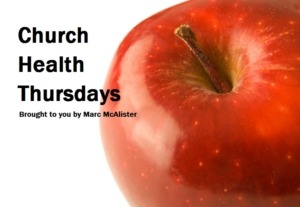Today is shameless plug day. I want to inform/ remind us all of some of the FMCiC resources available to you and your church as you work on this whole area of church health. Ready? Here we go.
- The Lifeplan. The LifePlan is a cyclic health conversation designed to lead congregations into responding and faithfully adapting to their changing context. The idea is that you would have this conversation every two or three years (giving time to implement and evaluate your ideas). There is a lot more information at the FMCIC website (including helpful instructional videos starring my friend and colleague Jared Siebert).
- Church Health Survey. This is a 16 question online survey that gives a snapshot of where churches are at in key Church Health areas (including vision, life change, leadership development, Great Commission engagement, community engagement, etc.) One of the great outcomes of this survey is the discussion and conversation it provokes among leaders as the results are unpacked. Every two years we ask pastors, board chairs and delegates to fill out this survey. But it is available any time for any church that wants to broaden the conversation (we have had up to 40 people complete the survey).
- The Appreciative Inquiry Process. The Appreciative Inquiry process is a daylong guided conversation that helps church leaders learn together and put together a plan for going forward. The questions asked and answered seek to affirm the past, build on the present and inspire hope for what might be. Not quite LifePlan, but a very helpful ministry planning tool.
- Asset Mapping. Asset Mapping is a one hour to half day guided conversation that can best be described as a way of brainstorming real actions (the things we can do by putting existing assets together in new ways) and empowering people to do what their hearts tell them to do. Through Asset Mapping people learn to: a) recognize and appreciate their own individual gifts, strengths and assets instead of focusing on needs and deficiencies, b) look for ways to connect their gifts and assets with others in order to meet needs and take action, and c) formulate an action plan by “voting with your feet”. Recently my network was talking about this process, and we wondered if it might be a way for “sub-groups” in a congregation to talk about how they could be involved in ministry (for example seniors or a youth group). Again, many churches have found it helpful.
- Church Health Thursdays. This thing you are ready right now. A weekly link to a (hopefully) thought provoking article. But these can also be used as starters for discussion in your church (at a board or ministry leaders meeting or just in your small group). Please keep reading.
So there you go. Five good tools to help you and your church. Each of the titles are click-able if you want more information. If you have any questions about them or would like more information, please do not hesitate to be in touch with me.
Marc McAlister
Director of Church Health, the Free Methodist Church in Canada




